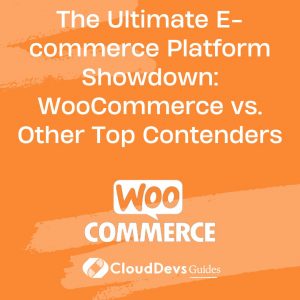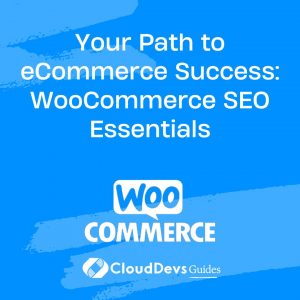The Ultimate E-commerce Platform Showdown: WooCommerce vs. Other Top Contenders
In today’s digital age, starting an online store has become more accessible than ever before. With numerous e-commerce platforms available, entrepreneurs and businesses have plenty of options to choose from. WooCommerce, a popular WordPress plugin, is one of the leading contenders in this space. However, it’s essential to weigh the pros and cons of WooCommerce against other e-commerce platforms to make an informed decision. In this blog post, we will compare WooCommerce with some of its prominent competitors, exploring their features, advantages, and disadvantages.
WooCommerce: A Brief Overview
Before we dive into the comparison, let’s briefly introduce WooCommerce. WooCommerce is a free, open-source e-commerce plugin designed for WordPress, the world’s most widely used content management system (CMS). It powers over 30% of all online stores, making it a formidable player in the e-commerce industry.
1. WooCommerce vs. Shopify
Shopify is a cloud-based, fully hosted e-commerce platform known for its user-friendly interface and ease of use. Here’s how WooCommerce stacks up against Shopify:
– Pricing: WooCommerce is free to use as a plugin, but you’ll need to pay for web hosting, domain registration, and potentially premium extensions. In contrast, Shopify offers a subscription-based model with plans ranging from $29 to $299 per month.
– Customization: WooCommerce offers more flexibility in terms of design and customization since it’s built on WordPress, which supports a vast ecosystem of themes and plugins. Shopify also has customization options but may be somewhat limited compared to WooCommerce.
– Ease of Use: Shopify is known for its user-friendliness, making it an excellent choice for beginners. WooCommerce, on the other hand, might have a steeper learning curve, especially for those new to WordPress.
– Scalability: Both platforms can scale with your business, but Shopify is often considered more suitable for fast-growing enterprises. WooCommerce can handle large stores too, but it may require more technical expertise to optimize performance.
– Payment Processing: Shopify includes its own payment gateway, while WooCommerce allows you to choose from various payment gateways. This flexibility can be advantageous, but it might also mean more setup work.
2. WooCommerce vs. Magento
Magento is another powerful e-commerce platform that is particularly popular among larger enterprises. Here’s how WooCommerce compares to Magento:
– Pricing: WooCommerce is more cost-effective for small to medium-sized businesses since it’s a free plugin for WordPress. Magento, on the other hand, can be significantly more expensive due to licensing fees, hosting costs, and development expenses.
– Customization: Both platforms offer extensive customization options, but Magento may require more technical expertise to set up and manage. WooCommerce, being part of the WordPress ecosystem, benefits from a vast library of themes and plugins.
– Scalability: Magento is known for its scalability and is often chosen by enterprises with complex needs. WooCommerce can handle scalability too, but it may not be as suitable for extremely large stores without additional optimizations.
– Performance: WooCommerce can be faster out of the box due to its lightweight nature. Magento may require more optimization to achieve similar performance levels.
– Community and Support: WooCommerce benefits from the large WordPress community and numerous support resources. Magento also has a dedicated community, but its resources may be more specialized and require a higher level of expertise.
3. WooCommerce vs. BigCommerce
BigCommerce is a cloud-based e-commerce platform that offers a range of features for businesses of all sizes. Here’s how WooCommerce stacks up against BigCommerce:
– Pricing: Both platforms offer pricing plans suitable for various business sizes. WooCommerce is free, but you’ll need to pay for hosting and premium extensions. BigCommerce has subscription-based pricing, with plans starting at $29.95 per month.
– Customization: WooCommerce offers extensive customization through WordPress themes and plugins. BigCommerce also supports customization but may have some limitations in terms of design flexibility.
– Ease of Use: BigCommerce is known for its user-friendly interface and comprehensive set of built-in features, making it a good choice for beginners. WooCommerce may require more technical knowledge, especially for complex setups.
– Scalability: Both platforms can scale with your business, but BigCommerce may offer more built-in features for growth, such as multi-channel selling and inventory management.
– Payment Processing: Both platforms support various payment gateways, giving you flexibility in choosing your preferred payment methods.
4. WooCommerce vs. Volusion
Volusion is another e-commerce platform that provides a range of features for online businesses. Here’s how WooCommerce compares to Volusion:
– Pricing: WooCommerce is free to use as a plugin, but you’ll incur hosting and extension costs. Volusion offers subscription-based pricing, with plans starting at $29 per month.
– Customization: WooCommerce offers robust customization options through WordPress themes and plugins. Volusion also allows customization but may have some limitations in design flexibility.
– Ease of Use: Volusion is known for its user-friendly interface and easy setup process, making it suitable for beginners. WooCommerce may require more technical knowledge, especially for complex setups.
– Scalability: Both platforms can scale with your business, but Volusion may have some limitations in terms of handling extremely large stores compared to WooCommerce.
– Payment Processing: Both platforms support various payment gateways, giving you flexibility in choosing your preferred payment methods.
Conclusion
Choosing the right e-commerce platform is a crucial decision for any online business. While WooCommerce offers numerous advantages, including flexibility, cost-effectiveness, and a vibrant community, it may not be the best fit for everyone. It’s essential to consider your specific needs, budget, and technical expertise when making this decision.
Shopify, Magento, BigCommerce, and Volusion are all strong contenders in the e-commerce landscape, each with its unique strengths and weaknesses. By carefully assessing your requirements and conducting a thorough comparison, you can make an informed choice that aligns with your business goals and sets you on the path to e-commerce success. Remember that no one-size-fits-all solution exists, so choose the platform that best suits your individual needs and aspirations.
Table of Contents







